Text
PMP® Exam Study Strategies: Navigating Your Path to Success
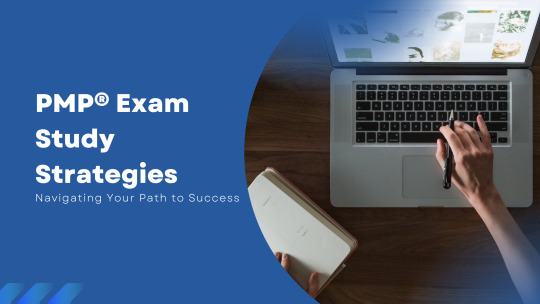
Preparing for the Project Management Professional (PMP)® exam is a significant undertaking, but with the right study strategies, you can navigate this journey with confidence and success. The PMP® exam tests not only your knowledge but also your ability to apply project management principles in real-world scenarios. Here are some effective study strategies to help you prepare for and pass the PMP® exam:
1. Understand the Exam Format: Start by understanding the structure of the PMP® exam. It consists of 180 multiple-choice questions and is divided into five domains: Initiating, Planning, Executing, Monitoring and Controlling, and Closing. Knowing the exam format will help you tailor your study approach.
2. Review the PMBOK® Guide: The Project Management Body of Knowledge (PMBOK)® Guide is the primary reference for the exam. Read and understand this guide thoroughly, as it forms the basis of the questions you’ll encounter.
3. Use Exam Prep Materials: Invest in high-quality PMP® exam preparation materials, including study guides, practice exams, and flashcards. These resources provide a structured approach to studying and help you assess your knowledge.
4. Study Regularly: Create a study schedule and stick to it. Consistent, focused study sessions are more effective than cramming. Allocate specific time slots for study and make it a routine.
5. Practice, Practice, Practice: Take as many practice exams as possible. They help you familiarize yourself with the exam format, improve time management, and identify weak areas for further study.
6. Understand the Concepts: Don’t just memorize information; understand the underlying concepts and how they apply in real project scenarios. This will help you answer situational questions on the exam.
7. Join Study Groups: Consider joining a PMP® study group or online forum. Discussing concepts with peers and sharing insights can enhance your understanding and motivation.
8. Use Mind Maps and Visual Aids: Create mind maps or visual aids to condense complex information and make it easier to recall.
9. Focus on Weak Areas: Identify your weakest knowledge areas and spend extra time on them. Review the PMBOK® Guide chapters related to those domains.
10. Take Breaks: Don’t study for long periods without breaks. Short, frequent breaks can boost retention and prevent burnout.
11. Teach Others: Explaining concepts to someone else can solidify your understanding. Consider teaching a study partner or even a non-PMP® colleague.
12. Stay Updated: Stay informed about any updates or changes to the PMP® exam syllabus. PMI® occasionally updates its content.
13. Simulate Exam Conditions: When taking practice exams, simulate actual exam conditions. Time yourself and create a distraction-free environment.
14. Review Mistakes: After taking practice exams, thoroughly review the questions you got wrong. Understand why you made those mistakes and learn from them.
15. Stay Confident: Believe in your preparation. Confidence can make a significant difference in how you perform on exam day.
16. Exam Day Preparation: On the day of the exam, arrive early, bring all required documents, and stay calm. Don’t forget to take short breaks during the exam to maintain focus.
17. Review and Reassess: If you don’t pass the exam on your first attempt, don’t be discouraged. Review your performance and adjust your study strategy as needed before retaking the exam.
Remember that PMP® exam preparation is a marathon, not a sprint. By following these study strategies and considering a PMI authorized PMP Exam Preparation course, you’ll build a solid foundation of knowledge and skills to excel on the PMP® exam and demonstrate your proficiency as a project management professional. Good luck!
0 notes
Text
Navigating the PMP® Exam Application Process: Your Gateway to Certification
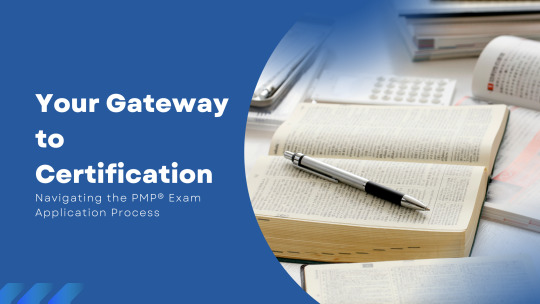
The path to becoming a certified Project Management Professional (PMP)® involves a well-defined application process set by the Project Management Institute (PMI)®. This process ensures that candidates meet the eligibility criteria and are ready to take on the challenging PMP® exam. Here’s a comprehensive guide to help you navigate the PMP® exam application process:
**1. Eligibility Check: Before diving into the application, ensure you meet the eligibility requirements based on your education and work experience. You need either a secondary degree (with five years of project management experience) or a bachelor’s degree (with three years of experience) along with 35 hours of project management education, or you can join a PMI authorized PMP Exam Preparation course.
**2. Create a PMI® Account: Visit the PMI® website and create an account. This account will serve as your gateway to the application process, exam scheduling, and accessing study materials.
**3. Start the Application: Once logged in, initiate the PMP® exam application. This process requires inputting details about your education, project management experience, and contact information.
**4. Experience Documentation: For each project you’ve managed, provide information about the project’s title, the organization, your role, and the number of hours spent in each of the five project management process groups (initiation, planning, execution, monitoring and controlling, and closing). You’ll also need to describe your key responsibilities.
**5. Education Documentation: If you’re using a bachelor’s degree to meet the eligibility criteria, you’ll need to provide details about your education, including the name of the institution, the degree earned, and the completion date.
**6. PM Education Documentation: If you’ve completed a formal project management education course or joined a PMI authorized PMP Exam Preparation course, you’ll need to provide information about the course, the institution, the date of completion, and the number of hours of instruction.
**7. Application Review: Review your application carefully to ensure accuracy and completeness. Once submitted, you cannot make changes without contacting PMI®.
**8. Application Payment: Upon completing the application, you’ll be prompted to pay the examination fee. PMI® offers different fee structures for PMI® members and non-members.
**9. Application Audit (If Applicable): PMI® conducts random audits to verify the information provided in your application. If selected for an audit, you’ll need to submit documentation, such as project descriptions, proof of education, and course certificates.
**10. Approval and Examination Scheduling: Once your application is approved (either immediately or after a successful audit), you’ll receive an eligibility ID. You can use this ID to schedule your PMP® exam at a Prometric test center or for online proctoring.
**11. PMP® Exam Preparation: While waiting for your exam date, engage in comprehensive exam preparation, including studying the PMBOK® Guide, using study materials, and taking practice exams.
**12. PMP® Exam Day: Arrive at the test center (or set up your online proctoring environment) on the scheduled exam day. Be prepared to tackle the 180 multiple-choice questions within the allotted time.
**13. Passing the Exam: Upon successfully passing the PMP® exam, you’ll receive your certification, which is valid for three years.
**14. Maintaining Certification: To maintain your PMP® certification, you must earn Professional Development Units (PDUs) through continuing education and participate in the PMI® Continuing Certification Requirements (CCR) program.
Remember that the PMP® application process is a critical step in your journey toward certification. Ensuring that your application is complete, accurate, and well-documented is key to a smooth and successful experience. With diligent preparation and adherence to the process, you’ll be well on your way to becoming a certified Project Management Professional.
0 notes
Text
PMP® Exam Eligibility Requirements: Your Path to Certification
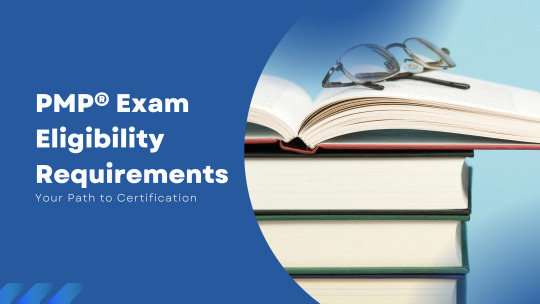
The Project Management Professional (PMP)® certification is a prestigious credential for project managers, demonstrating your expertise in the field. To become a PMP® certified professional, you must meet specific eligibility requirements set by the Project Management Institute (PMI)®. Here’s a breakdown of the PMP® exam eligibility requirements:
1. Education Requirements:
You must have a secondary degree (high school diploma, associate’s degree, or global equivalent) AND have accumulated a minimum of five years of project management experience, with at least 7,500 hours leading and directing projects.
OR
2. Bachelor’s Degree or Higher:
If you hold a four-year bachelor’s degree (or global equivalent), you can meet the PMP® eligibility requirements with a minimum of three years of project management experience, along with 4,500 hours of leading and directing projects.
3. Project Management Education:
In addition to the project management experience, you must complete 35 hours of project management education/training. This can be achieved through formal courses, workshops, online training from Registered Education Providers (R.E.P.s), academic institutions, or by joining a PMI authorized PMP Exam Preparation course.
Key Points to Remember:
The required project management experience should include the initiation, planning, execution, monitoring and controlling, and closing of projects.
The project management education should focus on project management topics and must be completed before applying for the PMP® exam.
Your project management experience and education should be documented and verified during the application process.
Application and Examination Process:
Application Submission: Complete the online application on the PMI® website, providing details about your project management experience, education, and contact information. PMI® will review your application, and if it meets the eligibility criteria, you will receive approval to take the exam.
Scheduling the Exam: Once your application is approved, you will receive an eligibility ID. You can use this ID to schedule your PMP® exam at a Prometric test center or for online proctoring.
PMP® Exam: The PMP® exam consists of 180 multiple-choice questions, and you have 230 minutes (3 hours and 50 minutes) to complete it. The exam covers a wide range of project management topics based on the PMBOK® Guide.
Passing Score: To pass the PMP® exam, you need to achieve a passing score, which is determined through a psychometric analysis process. PMI® does not disclose the specific passing score.
Certification: Upon passing the exam, you will receive the PMP® certification, which is valid for three years. To maintain your certification, you must earn Professional Development Units (PDUs) through continuing education and participate in the PMI® Continuing Certification Requirements (CCR) program.
Meeting the PMP® exam eligibility requirements is the first step on your journey to becoming a certified project management professional. Once you’ve met these requirements and successfully passed the exam, you’ll join a prestigious community of project managers and gain access to a world of career opportunities and professional development.
0 notes
Text
PMP® Certification Benefits: Elevating Your Project Management Career
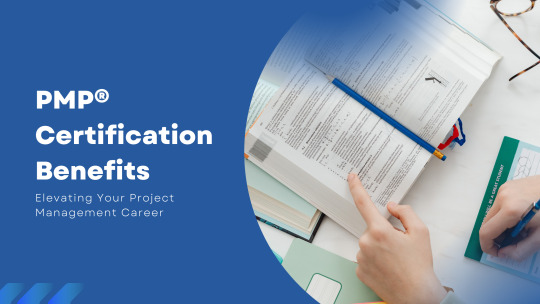
Achieving the Project Management Professional (PMP)® certification is not just an impressive accolade; it’s a transformative step in your project management career. Whether you’re an experienced project manager or just starting in the field, the PMP® certification offers a multitude of benefits that can propel your professional journey to new heights.
1. Globally Recognized Credential:
The PMP® certification is globally recognized and respected, showcasing your expertise in project management across borders and industries.
2. Career Advancement:
PMP® certification opens doors to higher-level job opportunities, increased responsibilities, and faster career progression. It can put you on the fast track to leadership roles.
3. Enhanced Skills:
The rigorous PMP® exam preparation equips you with in-depth knowledge and skills in project management, enabling you to tackle complex projects effectively.
4. Increased Earning Potential:
PMP® certified professionals typically earn higher salaries than their non-certified peers. The certification can significantly boost your earning potential.
5. Competitive Edge:
In a competitive job market, the PMP® certification sets you apart. Employers often prefer or require PMP® certification for project management positions.
6. Industry Versatility:
The PMP® certification is not industry-specific, making it applicable across various sectors, from IT to healthcare to construction.
7. Global Networking:
As a PMP® certified professional, you gain access to a global network of like-minded experts and peers through the Project Management Institute (PMI)®.
8. Improved Project Success Rates:
With your enhanced project management knowledge, you’re better equipped to lead projects to successful completion, reducing risks and costs.
9. Confidence and Credibility:
PMP® certification boosts your self-confidence and credibility, allowing you to tackle challenges with assurance and earn the trust of stakeholders.
10. Adherence to Best Practices:
PMP® certification ensures you adhere to best practices in project management, fostering a culture of excellence within your organization.
11. Continuous Learning:
Maintaining your PMP® certification requires ongoing professional development, keeping your skills current and relevant.
12. Leadership Opportunities:
PMP® certification prepares you for leadership roles, enabling you to guide and inspire project teams effectively.
13. International Projects:
If you aspire to work on international projects, the PMP® certification demonstrates your ability to manage diverse and complex initiatives.
14. Problem-Solving Skills:
The PMP® certification hones your problem-solving skills, enabling you to navigate challenges and find creative solutions.
15. Ethical Responsibility:
PMP® certified professionals adhere to PMI’s Code of Ethics and Professional Conduct, emphasizing ethical responsibility in project management.
In essence, the PMP® certification is not just a qualification; it’s a career investment. It empowers you with knowledge, skills, and opportunities that can reshape your professional trajectory. Whether you’re seeking personal growth, career advancement, or the chance to make a substantial impact in the world of project management, PMP® certification is your gateway to a brighter, more rewarding future.
0 notes
Text
PMP® Exam Study Materials: Your Path to Project Management Excellence
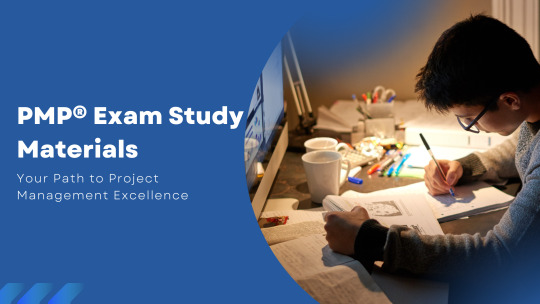
The Project Management Professional (PMP)® exam is a prestigious certification that opens doors to career advancement and demonstrates your proficiency in project management. To ace this exam, comprehensive study materials are your compass. This guide will lead you through the essential study materials required to prepare for the PMP® exam.
1. PMBOK® Guide: The Project Management Body of Knowledge (PMBOK)® Guide is the foundational resource for the PMP® exam. It’s your bible for understanding the principles and best practices of project management.
2. PMP® Exam Prep Books: Numerous PMP® exam prep books are available, offering detailed explanations, practice questions, and tips for exam success. Popular choices include books by Rita Mulcahy and Andy Crowe.
3. Online PMP® Exam Prep Courses: Online courses provide structured learning and often include practice exams and quizzes. Platforms like Udemy, Coursera, and LinkedIn Learning offer reputable PMP® exam prep courses.
4. Practice Exams: Practice exams are invaluable for gauging your readiness. They mimic the actual exam format and help you identify weak areas. Consider using tools like PMI’s practice exam or other online providers.
5. Flashcards: Flashcards are an excellent tool for memorizing key concepts, formulas, and definitions. You can create your own or find PMP® flashcard sets online.
6. Study Groups and Forums: Joining a PMP® study group or participating in online forums like the PMI community can provide insights, clarifications, and moral support from fellow exam takers.
7. Mobile Apps: PMP® exam prep apps allow you to study on the go. Apps like PM PrepCast, PMP® Pocket Prep, and PMTraining are popular choices.
8. Podcasts and YouTube Channels: Listening to PMP®-related podcasts or watching YouTube channels dedicated to PMP® exam prep can reinforce your understanding of key concepts.
9. Exam Simulators: Simulators offer full-length practice exams that closely mimic the real test environment. These are essential for building exam endurance and assessing your progress.
10. Study Plan and Schedule: Develop a study plan and schedule to keep yourself on track. Allocate time for each knowledge area and stick to your plan.
11. Mind Mapping and Visual Aids: Creating mind maps or visual aids can help you condense complex information and make it easier to recall.
12. The PMI Code of Ethics and Professional Conduct: Familiarize yourself with PMI’s Code of Ethics and Professional Conduct as questions on ethical considerations may appear on the exam.
13. PMP® Handbook: The PMP® Handbook by PMI provides essential information about the exam’s content, format, and eligibility criteria.
14. Notes and Formula Sheets: Compile notes and formula sheets summarizing key concepts and equations for quick reference.
15. PMP® Study Apps and Tools: Various apps and online tools offer additional support for PMP® exam preparation. These include PMI’s official app and tools like PMP® Exam Mentor.
Remember, success in the PMP® exam relies on diligent preparation and utilizing a combination of these study materials. Customize your study plan to align with your learning style and schedule, and don’t hesitate to seek advice from PMP® certified professionals who have successfully conquered this challenging exam. Good luck on your journey to PMP® certification!
0 notes